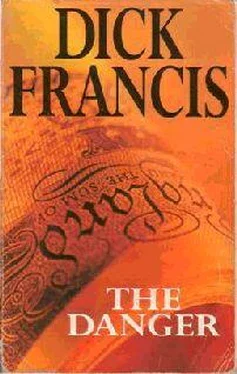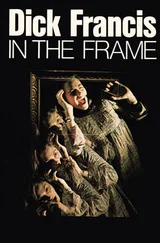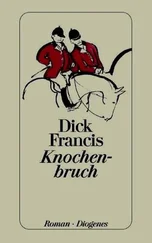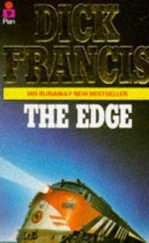They were off, they were running, the gold and white figure with them, going faster than the wind and to my mind crawling like slow motion.
Brunelleschi, the brute who kicked, put his bad moods to good use, shouldering his way robustly round the first bunched-up bend, forcing himself through until there was a clear view ahead. Doesn't like to be shut in, Alessia had said. She gave him room and she held him straight: they came past the stands for the first time in fourth place, the whole field close together. Round the top bend left-handed, down the back stretch, round the last corner towards home.
Two of the leaders dropped back: Brunelleschi kept on going. Alessia swung her stick twice, aimed the black beast straight at the target and rode like a white and gold arrow to the bull.
She won the race, that girl, and was cheered as she came to the winners' enclosure in front of the stands. She was photographed and filmed, her head back, her mouth laughing. As Brunelleschi stamped around in his winner's garland of laurels (what else?) she reached forward and gave his dark sweating neck a wide-armed exultant pat, and the crowd again cheered.
I wholeheartedly shared in her joy: and felt lonely.
They all came up to the dining room for champagne - winners, losers and Eric Rickenbacker looking ecstatic.
'Well done,' I said to her.
'Did you see?' She was high, high with achievement.
'Yes, I did.'
'Isn't it fantastic?'
'The day of a lifetime.'
'Oh, I do love you,' she said, laughing, and turned away immediately, and talked with animation to a throng of admirers. Ah, Andrew, I thought wryly, how do you like it? And I answered myself; better than nothing.
When I finally got back to the hotel the message button was flashing on my telephone. My office in England had called when I was out. Please would I get through to them straight away.
Gerry Clayton was on the switchboard.
'Your Italian friend rang from Bologna,' he said. 'The policeman, Pucinelli…'
'Yes?'
'He wants you to telephone. I couldn't understand him very well, but I think he said he had found Giuseppe-Peter.'
By the time I got the message it was three in the morning, Italian time. On the premise, however, that the law neither slumbered nor slept I put the call through straightaway to the carabinieri, and was answered by a yawning Italian who spoke no English.
Pucinelli was not there.
It was not known when Pucinelli would be there next.
It was not known' if Pucinelli was in his own house.
I gave my name, spelling it carefully letter by letter but knowing it would look unpronounceable to most Italians.
I will telephone again, I said; and he said, 'Good.'
At one in the morning, Washington time, I telephoned Pucinelli's own home, reckoning his family would be shaping to breakfast. His wife answered, children's voices in the background, and I asked for her husband, in Italian.
'Enrico is in Milan,' she said, speaking slowly for my sake. 'He told me to give you a message.' A short pause with paper noises, then: 'Telephone this house at fourteen hours today. He will return by that time. He says it is very important, he has found your friend.'
'In Milan?' I asked,
'I don't know. Enrico said only to ask you to telephone.'
I thanked her and disconnected, and slept fitfully while four thousand miles away Pucinelli travelled home. At fourteen hours, two p.m. his time, eight a.m. in Washington, I got through again to his house and found he had been called out on duty the minute he returned.
'He is sorry. Telephone his office at seventeen hours.'
By that time, I reckoned, my fingernails would be bitten to the knuckle. My stomach positively hurt with impatience. I ordered breakfast from room service to quieten it and read the Washington Sunday papers and fidgeted, and finally at eleven I got him.
'Andrew, how are you?' he said.
'Dying of suspense.'
'What?'
'Never mind.'
'Where are you?' he said. 'Your office said America.'
'Yes. Washington. Have you really found Giuseppe-Peter?'
'Yes and no.'
"What do you mean?'
'You remember,' he said, 'that we have been enquiring all the time among horse people, and also that we were going to try some students' reunions, to see if anyone recognised him from the drawing.'
'Yes, of course,' I said.
We had drifted automatically into our normal habit of speaking two languages, and it seemed just as satisfactory as ever.
'We have succeeded in both places. In both worlds.' He paused for effect and sounded undeniably smug. 'He lives near Milan. He is thirty-four now. He went to Milan University as a student and joined radical political groups. It is believed he was an activist, a member of the Red Brigades, but no one knows for sure. I was told it was a fact, but there was no true evidence. Anyway, he did not continue in political life after he left university. He left without sitting his final examinations. The university asked him to leave, but not because of his radical opinions. They made him leave because he forged cheques. He was not prosecuted, which I think is a mistake.'
'Mm,' I agreed, riveted.
'So then I had his came. And almost immediately, the same day that I learned it, we had the information from the horse people. They say he is not well known in the horse world, he never goes to the races, he is the black sheep of a well-regarded family, and is banished from their house. No one seems to be absolutely certain in detail why this is, but again there are many rumours that it is to do with fraud and forging cheques. Everyone believes the father repaid every penny to keep the family name out of the disgrace.'
'But the horse world told you this?'
'Yes. In the end, someone recognised him. Our men were very diligent, very persistent.'
"They're to be congratulated,' I said sincerely.
'Yes, I agree.'
'What is his name?' I asked. It hardly seemed to matter, but it would be tidier to give him the proper label.
'His father owns racehorses,' Pucinelli said. 'His father owns the great horse Brunelleschi. Giuseppe-Peter's real name is Pietro Goldoni.'
Washington D.C. seemed to stand still. Suspended animation. I actually for a while stopped breathing. I felt stifled.
'Are you there, Andrew?' Pucinelli said.
I let out a long breath. 'Yes…'
'No one has seen Pietro Goldoni since the summer. Everyone thinks he went abroad and hasn't come back.' He sounded pleased. 'It fits the timetable, doesn't it? We chased him out of Italy and he went to England.'
'Er…' I said faintly, 'have you heard about Morgan Freemantle? Did you read anything in the papers yesterday or today, see anything on television?'
Who? I have been so busy in Milan. Who is Morgan Freemantle?'
I told him. I also said, 'Bruno and Beatrice Goldoni have been here all this week in Washington. I have talked to them. Brunelleschi won the big International race here yesterday afternoon. Alessia Cenci rode it.'
There was the same sort of stunned breathless silence from his end as there had been from mine.
'He is there,' he said finally. 'Pietro Goldoni is in Washington.'
'Yeah.'
'You of course knew that.'
'I assumed that Giuseppe-Peter was here, yes.'
He paused, considering. 'In what way is it best that I inform the American police of his identity? It may be that my superiors would want to consult… '
'If you like,' I said politely, 'I myself will first tell the police captain in charge of things here. The captain might be pleased to talk to you then direct. There's an Italian-speaker in his force who could translate for you both.'
Pucinelli was grateful and careful not to sound it. "That would be excellent. If you would arrange it, I am sure it would be helpful.'
Читать дальше












